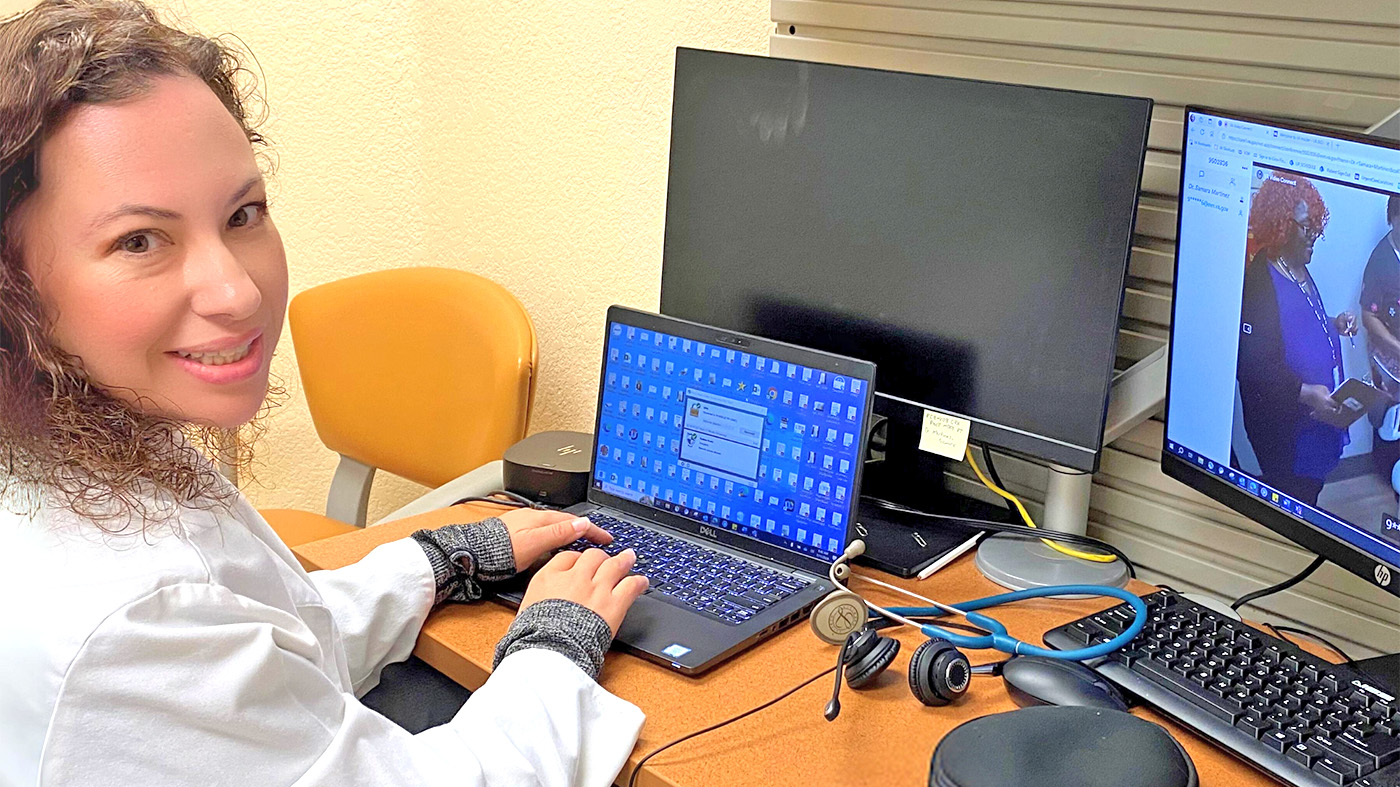In a paper published in the New England Journal of Medicine, VA researchers Drs. Ziyad Al-Aly, Yan Xie and Taeyoung Choi present findings from a study of over 5 million Veterans that substantiate the important protective role COVID-19 vaccination plays in preventing a health condition called Long COVID.
Last week’s study is the largest yet to look at the role vaccination plays in preventing Long COVID as well as trends in the prevalence of Long COVID among Veterans over time. This cohort study followed Veterans who received VA health care across the country between March 1, 2020, and Jan. 31, 2022, for one year, ultimately comparing 441,583 Veterans who had SARS-CoV-2 infection to 4,748,504 Veterans who did not.
VA researchers compared the incidence of Long COVID between vaccinated and unvaccinated Veterans and also across time, defining three significant eras of the COVID-19 pandemic: 1) before delta became the dominant SARS-CoV-2 variant, 2) when delta was the dominant variant circulating (summer 2021) and 3) when omicron was the dominant variant circulating (winter 2021-2022).
Key role vaccination plays in protecting Veterans from Long COVID
Two important findings came out of this study. First, COVID-19 vaccination plays a major role in decreasing Veterans’ risk for Long COVID. The study showed that the risk of Long COVID among vaccinated Veterans was 44% lower during the delta variant’s peak and 55% lower during the omicron variant’s peak than their unvaccinated counterparts.
Second, VA researchers demonstrated that while the overall risk of Long COVID has decreased over time for both vaccinated and unvaccinated Veterans – likely due in part to evolution of the SARS-CoV-2 virus itself – the decrease in risk was more notable for vaccinated Veterans. At the start of the pandemic before COVID-19 vaccines were available, 10.4% of Veterans who were infected with SARS-CoV-2 went on to develop Long COVID.
In comparison in the most recent era, among vaccinated Veterans, only 3.5% of vaccinated Veterans who were infected with SARS-CoV-2 went on to develop Long COVID compared to 7.8% of unvaccinated Veterans.
Over the study period, vaccinated Veterans experienced a 34% decrease in their risk of experiencing any Long COVID symptoms compared to a 26% decrease in risk for unvaccinated Veterans. Overall, COVID-19 vaccination was identified by the VA study team as one of the biggest driver of this overall decrease of Long COVID incidence over time, finding that 72% of the decrease in Long COVID occurrence was attributable to COVID-19 vaccination.
Long COVID can affect individuals with no symptoms during COVID-19
At this point, many have heard of the condition “Long COVID” and many may have personally experienced long COVID-like symptoms, either knowingly or unknowingly. From the very beginning of the pandemic, VA researchers and health care providers have worked tirelessly to better understand Long COVID and develop care pathways to address the needs of Veterans impacted by this condition.
The Centers for Disease Control and Prevention’s (CDC) currently defines Long COVID as a chronic condition lasting at least three months following SARS-CoV-2 infection. While the likelihood of experiencing Long COVID increases the more severe a person’s COVID-19 illness was, Long COVID can occur even among individuals who had mild COVID-19 and those who experienced no symptoms at all during their COVID-19 illness.
Long COVID symptoms can come and go over time and can vary greatly between one person to the next but some of the more common symptoms include: fatigue, respiratory and heart symptoms (such as shortness of breath, heart palpitations), neurological symptoms (such as brain fog, headaches, difficulty sleeping), digestive symptoms and joint or muscle pain.
You can learn more about Long COVID symptoms and how to follow-up with your VA health care provider should you think you’re experiencing Long COVID here.
Vaccination the best way for protection against COVID-19 and Long COVID
As COVID-19 cases begin to once again rise across the nation, the findings of this study underscore the important role vaccination can have in not only protecting Veterans from infection in the first place but also reducing the likelihood of the long-term health consequences.
While no vaccine is perfect, even vaccinated individuals who come down with COVID-19 tend to have significantly lower viral loads. This translates to experiencing fewer and milder symptoms and getting better faster. As this study importantly highlights, COVID-19 vaccination also significantly reduces the risk of longer-term negative consequences of SARS-CoV-2 infection such as Long COVID.
VA offers the most up-to-date COVID-19 vaccines free of charge to all Veterans enrolled in VA health care and all VA health care employees. To find VA’s current guidance on COVID-19 vaccination and to learn how to get vaccinated, visit the webpage. Even if you have yet to receive a COVID-19 vaccine, it’s not too late to protect yourself and your loved ones.
Anyone can also receive COVID-19 vaccination at no cost outside of VA. You can find a COVID-19 vaccine site near you.
Topics in this story
Link Disclaimer
This page includes links to other websites outside our control and jurisdiction. VA is not responsible for the privacy practices or the content of non-VA Web sites. We encourage you to review the privacy policy or terms and conditions of those sites to fully understand what information is collected and how it is used.
More Stories
Feeling stressed? Your breath can help you relax and focus. Take 3 minutes to reset and prioritize your well being for this week's #LiveWholeHealth practice.
More than 400 volunteers support Tennessee Valley VA to lift the spirits of Veterans receiving treatment.
Clinical Resource Hubs ensure Veterans receive medical and specialty care with telehealth and other technologies.







If these so called studies are covering long covid research, shouldn’t they be sharing their studies and data on vaccination injuries and deaths as well. Makes you wonder why all the studies are one sided?
I try not to habitually presume things, but I presume you’re an individual that doesn’t trust the Covid vaccine. If you don’t trust the most studied vaccine in human history in relation to how long it’s been around…what, or who, do you trust? Saying things like “so called” implies there is deception involved. What parameters are you going off of to think this isn’t a legitimate study? And lastly, you’re more than welcome to look up the CDC stats on reported vaccination injuries and deaths. This study isn’t about that.I wish you good health, and hope that if the vaccine is something you could benefit from that you consult with a member of the medical community that you trust for advice.
My wife and I both had COVID, she was hospitalized and I was treated as an ambulatory out patient. She developed Long COVID with brain fog and other neurological symptoms and I did not. Is VA doing any research to develop Long COVID treatments that are effective in offsetting the neurological symptoms? From journals it seams a lot of researchers appear to be working with a variety of new medications to offset brain fog. Is VA also pursuing this?
I have received all COVID vacations offered. I have no after effects from taking all the shots.
I would recommend that everyone get vaccinated. please be safe and keep your families safe.
Covid, killed my brother marine
My captain usmc blood clots
Killed many veterans.
I have been diagnosed with LONG COVID and with COPD/asthma, peripheral neuropathy, unstable angina, and temporary glaucoma that went away. I suffer from this disease terribly because I worked as a security guard at a hospital escorting COVID-19 infected patients during the height of the pandemic. I was unindated with COVID-19 for a 10 month period and experienced health issues I’ve never experienced before. It’s caused me to be disabled and unable to work and in some instances take care of myself. This disease is tormenting me and I wouldn’t wish this on my worst enemy.